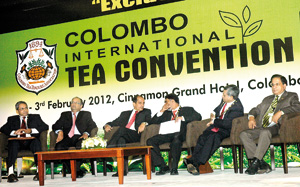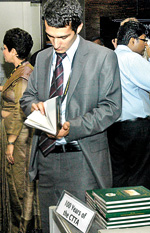The 20th Session of the FAO’s Inter-Governmental Group on Tea in Colombo was concluded in Colombo this week stressing the need for global cooperation towards obtaining maximum residue levels (MRLs) in tea as the consumers are increasingly sensitive to pesticide residues.
 |
| Panel discussion.
Pix by Saman Kariyawasam |
The stringent MRLs set by the importing countries including EU, US, Canada, Australia and Japan pose Sri Lankan tea producers and exporters as well as other tea producing countries a non-tariff trade barrier.
The Tea Research Institute’s (TRI) interventions at the sessions helped the tea growers in meeting standards in the safe use of pesticides while achieving the MRLs set by respective countries as well as to minimize non-tariff trade barriers faced by tea exporters.
The institute’s efforts have strengthened the image of Sri Lankan tea in the international tea trade with respect to rational use of agrochemicals, Dr Keerthi Mohotti, Head, Entomology Division - TRI said.
A decision has been taken to collect all available research data on climate change in member states, to determine its impact on the tea economy. Sri Lanka along with other producing countries opposed the proposal for the ‘Carbon footprint’ and ‘Water print’ being requirements for future tea exports. At the forthcoming meeting, a road map will be drawn up to work on recognizing the level of climate change impacts and appropriate mitigation measures and to develop appropriate long term technologies for mitigation/adaptation for the benefit of the global tea industry, he revealed.
 |
| Checking out the history of tea |
Sri Lanka has pioneered organic tea production and exports among the tea growing countries. The TRI has been facilitating the organic tea growers and exporters in making appropriate avenues in meeting the organic standards. Sri Lankan organic tea fetches high premium in the value added sector while paving sustainable and environmentally friendly tea production systems.
The discussions at the session facilitated preparation of a constitution of the Working Group on organic tea. The coordination work will be undertaken by India with Sri Lanka taking a leading role.
Sri Lanka has taken the lead role on the reactivation of the International Tea Producers’ Forum (ITPF) with the concurrence / representatives of Kenya, India, Uganda, Malawi, Tanzania and Argentina. It was agreed upon the urgency and the importance of this activity which has become essential to safe guard the interests of the tea producing countries such as standards. Sri Lanka took the leading role in formulating terms of references and modalities in forming the ITPF, he disclosed.
The inauguration ceremony of the 20th session of Food and Agricultural Organization (FAO) of the Inter-Governmental Group on Tea under the auspices of the UN was held in Colombo on Monday with Mahinda Samarasinghe, Minister of Plantation Industries as the Chief Guest. Around 100 delegates from 23 countries attended the meeting focusing attention on critical issues of common interest to tea producing nations and tea consuming countries.
While admitting that some issues were common to tea producer and tea consumer countries, Minister Samarasinghe proposed the establishment of an International Tea Producer forum.
The global economic downturn which erupted few years back is still continuing and has resulted in many countries revising their growth rates downwards. The volatility in the Middle East and the Gulf combined with the crisis in the Euro zone will make it harder for smooth trade to continue. The tsunami and the nuclear disaster which hit Japan - another major buyer of Ceylon Tea – brought in new difficulties, he said.
Patrick Evans, FAO country director for Sri Lanka and the Maldives revealed that Sri Lanka’s high poverty levels in the tea plantation sector should be tackled considering it as a matter of priority. The tea industry plays a vital role in the country’s economy, employing over a million people.
Addressing a press conference after the inauguration ceremony, Gerry Jayawardena, Chairman of the TRI, said the institute is experimenting with new varieties of tea with greater ability to sustain drought and disease. He revealed that new types of tea plnts were needed to sustain changes in climate and consumer preferences for food grown with the use of natural fertilizer.
The TRI will introduce the '5000' series of cultivar which will be released in two years, he said
Meanwhile the Colombo International Tea Convention was inaugurated by Plantation Industries Minister Mahinda Samarasinghe in Colombo on Thursday, marking 145 years of the Ceylon tea industry. It was organized by the Colombo Tea Traders' Association together with the Sri Lanka Tea Board. This event drew 100 foreign delegates and 300 local tea professionals.
Minister Samarasinghe told the gathering that 6% of tea smallholders and 24% of regional plantation companies owned and operated by the Government handle the tea production of Sri Lanka. The budgets of last year and this year understood and appreciated the significant contribution of the tea industry to the economy of the nation and hence vast amount of resources have been earmarked to assist the small holders so that they can contribute even in the future for sustainability of the tea industry in Sri Lanka, he said . |



